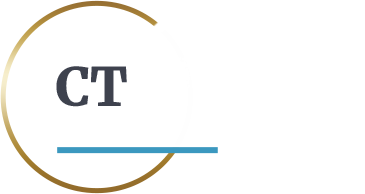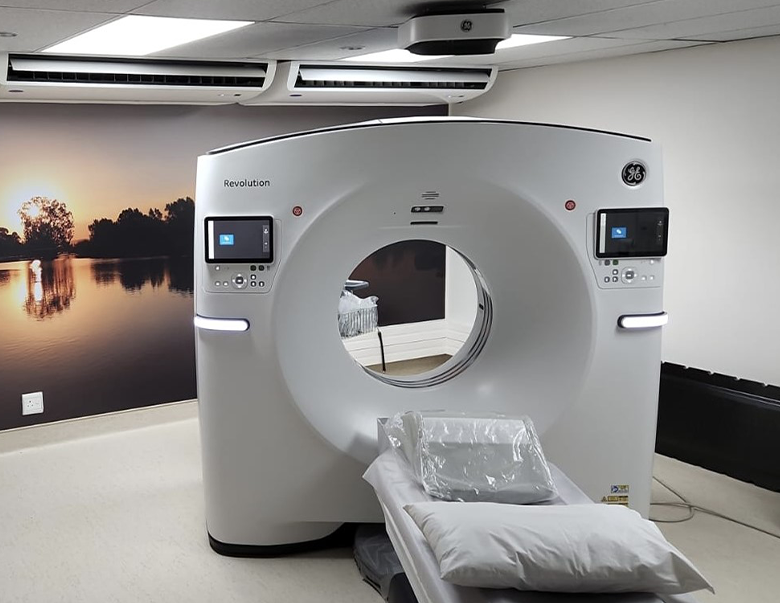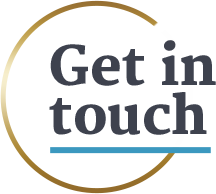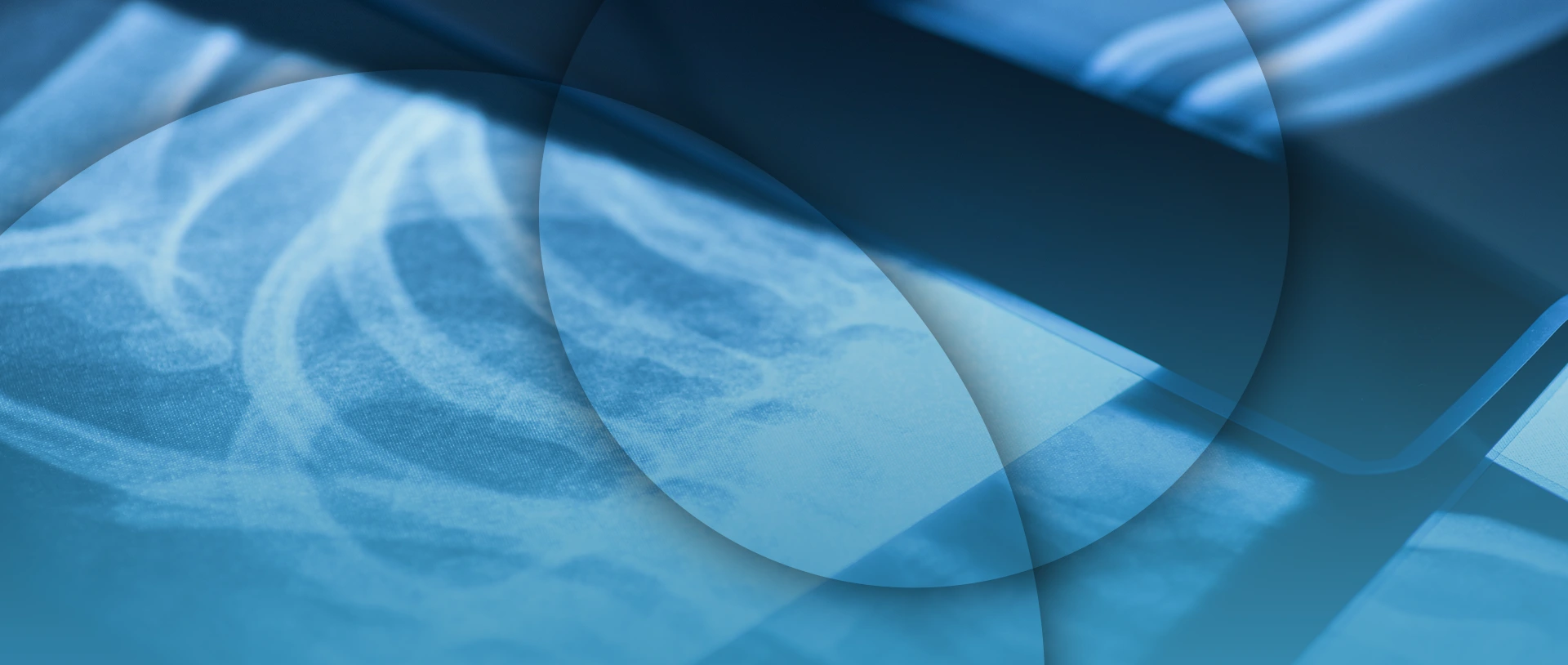


Computed Tomography, more commonly known as CT or CAT scan, is a diagnostic medical test that, like traditional X-rays, produces multiple images or pictures of the inside of the body.
The cross-sectional images generated during a CT scan can be reformatted in multiple planes and can even generate 3D images. These images can be viewed on a computer monitor and transmitted electronically to your referring doctor. CT images of internal organs, bones, soft tissues and blood vessels typically provide greater detail than traditional X-rays, particularly of soft tissues and blood vessels.
Using specialised equipment and expertise to create and interpret CT scans of the body, radiologists can more easily diagnose cancers, cardiovascular disease, infectious disease, appendicitis, trauma and musculoskeletal disorders.
Is booking required?
Yes
Branches: Mediclinic Vereeniging and Midvaal Private Hospitals
What are some of the common uses of the procedure?
- One of the best and fastest tools for examining the chest, abdomen and pelvis because it provides detailed cross-sectional views of all types of soft tissue.
- Used to determine severe injuries from incidents such as motor vehicle accidents.
- Performed on patients with acute symptoms such as abdominal pain or difficulty breathing.
- Often the best method of detecting many different cancers, including lung, liver, kidney and pancreatic cancer, since the image allows a physician to confirm the presence of a tumour and determine its size, precise location and extent of tumour involvement with other nearby tissues.
- CT examination plays a significant role in detecting, diagnosing and treating vascular diseases that can lead to stroke, kidney failure, or even death.
How should I prepare for the procedure?
You may be asked not to eat or drink anything for few hours before the procedure, especially if oral contrast material will be used in the exam. You should inform your physician of all medications you are taking and of any allergies you may have. If you have a known allergy to contrast material or “dye”, your doctor may prescribe medication (usually a steroid) to reduce the risk of an allergic reaction. These medications generally need to be taken 12 hours before administering contrast material. To avoid unnecessary delays, contact your doctor before the scheduled exam. Some medications may be needed to be discontinued before your exam. Women should always inform their physician and the CT radiographer if there is any possibility that they may be pregnant. You may be given a gown to wear during the procedure. Metal objects, including jewellery, spectacles, dentures and hair accessories may affect the CT image quality and should be removed prior to the examination. You may also be asked to remove hearing aids and removable dental appliances. Women will be asked to remove underwire bras. You may be asked to remove any piercings, if possible. You should inform the radiographer if you have a pacemaker device within the upper chest wall. This is usually not an issue for most CT exams as it is quick with no lasting consequences.
What does the procedure entail?
The radiographer begins by positioning you on the CT examination table, usually lying flat on your back or, less commonly, on your side or on your stomach. Straps and pillows may be used to help you maintain the correct position and to help you remain still during the examination. You may be requested to raise your arms over your head depending on the part of the body being scanned. Our state-of-the-art CT scanner is so fast, it can scan through large sections of the body in just a few seconds and even faster in small children. Reconstruction of data may take a few minutes, with a report following. The CT scanner technique will be adjusted to children’s size and limited to the area of interest to reduce the radiation dose. For some CT exams, contrast material is used to enhance visibility in the area of the body being studied. If contrast material is used, it will be swallowed, injected through an intravenous (IV) line or administered by enema, depending on the type of examination. The CT examination is usually completed within 30 minutes. The portion requiring intravenous contrast injection usually lasts only 10-30 seconds. A CT examination is generally quick and painless. Though the scan itself causes no pain, there may be discomfort from remaining still for several minutes and having an IV access line placed. If you have a hard time lying still, are very anxious or have chronic pain, you may find a CT exam stressful. If an intravenous contrast material is used, you will feel a pinprick when the needle is inserted into your vein. You will likely have a warm, flushed sensation during the injection of the contrast material and metallic taste in your mouth that may last a minute or two.
On the CT bed, non harmful laser beam red light lines may be seen projected onto your body and are used to ensure that you are properly positioned. With modern CT scanners you will hear only slight buzzing, clicking and whirring sounds as the CT scanner revolves around you during the imaging process.

Thank you for considering Vaal Radiology for your diagnostic imaging needs. We look forward to serving you soon.




Available Doctors
Dr MPG Kitsa
Dr AB Mehtar
Dr VJ Radebe
Dr J Veldman
Midvaal Private Hospital
Tel: 016 430 4330
Nile Drive Three Rivers
Accounts
Tel: 016 430 4350/4357
Email: accounts@vaalrad.co.za
PO Box 838 Vereeniging 1930
Mediclinic Vereeniging
Tel: 016 430 4300
Cnr Joubert/Rhodes Ave Vereeniging
Dr MPG Kitsa
Dr AB Mehtar
Dr VJ Radebe
Dr J Veldman
Tel: 016 430 4330
Nile Drive Three Rivers
Tel: 016 430 4350/4357
Email: accounts@vaalrad.co.za
PO Box 838 Vereeniging 1930
Tel: 016 430 4300
Cnr Joubert/Rhodes Ave Vereeniging
Proudly designed by Bunnypants Graphic & Web Design Studio | 2024


